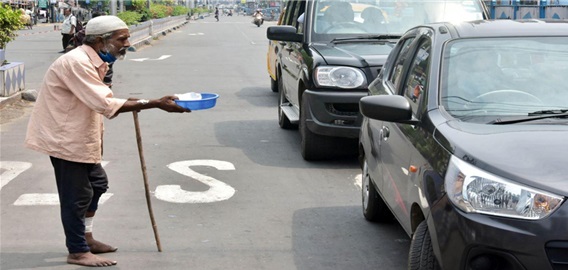Why in the NEWS?
- Bhopal District Collector has issued orders to ban begging in the district and has taken strict measures including filing FIR for giving and taking alms.

Key Points:
- Following Indore, Bhopal has also banned begging in all public places, criminalizing both begging and giving alms.
- This move has sparked debate, raising concerns about its impact on the poor and the need for rehabilitation-focused solutions instead of punitive measures.
- The ban reflects a trend in some Indian states to address begging through legal restrictions rather than social support programs.
What will you read next in this topic?
- Under which law have the orders been issued to prohibit begging?
- Is begging illegal anywhere else?
- Efforts by the central government and other states to tackle begging.
- Possible ways to tackle begging.
Under which law have the orders been issued to prohibit begging?
- The orders prohibiting begging in Indore and Bhopal were issued under Section 163 of the Indian Civil Security Code (BNSS), 2023.
- This section allows authorities to issue orders in cases of nuisance or apprehended danger.
- Disobedience of these orders can be punished under Section 223 of the Indian Justice Code (BNS) with imprisonment and/or fines.
- This section punishes those who disobey an order promulgated by a public servant who has the legal authority to do so.
- If the order under the section is not followed, the person can be punished with simple imprisonment up to six months, fine up to Rs 2500 or both.
- If the disobedience of the order causes or tends to cause danger to human life, health or safety, the imprisonment can be extended to one year and fine can be up to Rs 5000.
- While Section 163 orders typically last for two months (extendable to six by the state government), similar orders under the previous Section 144 of the Code of Criminal Procedure were frequently extended.
Is begging illegal anywhere else?
- Bombay Prevention of Beggary Act, 1959:
- This was India's first law against begging.
- This law was enacted to keep destitute persons, leprosy patients or people with mental illnesses off the streets. Under this law, the police can pick up people who have no direct means of livelihood.
- The punishment under this law is up to 10 years of detention.
- Delhi High Court verdict:
- In 2018, the Delhi High Court decriminalised begging by declaring some sections of the Bombay Prevention of Beggary Act unconstitutional.
- The court said that begging is the last resort of people's livelihood and it is the responsibility of the government to provide basic amenities to all citizens.
- Laws of other states:
- Many states, including Maharashtra, still consider begging a crime under the Bombay Prevention of Beggary Act.
- There is no central act on begging in the country, but several states have enacted their own laws, most of which are based on the 1959 Act.
Efforts by the central government and other states to tackle begging.
Efforts by the Central Government:
- Destitute Persons (Protection, Care and Rehabilitation) Model Bill, 2016:
- This bill was a significant effort that focused on decriminalizing begging and rehabilitating homeless people.
- Though the bill could not be passed, it sparked a national level debate on the issue and provided a basis for future policy changes.
- The bill emphasized on rehabilitation of homeless persons through setting up of shelter homes in each district, skill development and vocational training.
- Campaign by the Ministry of Social Justice and Empowerment:
- This ministry proposed to include ten cities including Mumbai in its campaign to focus on rehabilitation rather than criminalizing begging.
- This was a positive step that looks at begging as a social problem and not just a law and order issue.
- However, the success of this campaign and its long-term impact is yet to be assessed.
Efforts by other states:
- Delhi High Court judgment (2018):
- This judgment was a landmark ruling that decriminalised begging.
- It highlighted that begging is often a result of poverty and social exclusion, and cannot be resolved through criminal laws.
- This judgment also prompted other states to reconsider the issue.
- Policies by different states:
- Several states have announced policies to make cities 'begging-free'.
- These policies often involve banning begging, sending beggars to shelter homes, and running rehabilitation programmes.
- However, the effectiveness of these policies has varied from state to state.
- In some states, these policies have led to further marginalisation of beggars, while in some states they have produced positive results.
Possible ways to tackle begging.
- Forced begging:
- This is a serious problem that needs to be addressed.
- The government should take strict action against rackets that force people to beg.
- Social protection measures:
- The long-term solution to the problem of begging lies in reducing poverty and social inequality.
- The government should strengthen social protection measures in areas such as education, health, employment and housing.
- Role of NGOs:
- NGOs play an important role in the rehabilitation of beggars.
- They are often in a better position than the government to reach out to beggars and provide them assistance.
|
Q. The Bombay Prevention of Beggary Act, 1959, is significant because it was:
(a) The first central legislation addressing begging in India.
(b) The model for many subsequent state-level anti-begging laws.
(c) The legislation that decriminalized begging in India.
(d) Primarily focused on the rehabilitation of beggars.
|

 Contact Us
Contact Us  New Batch : 9555124124/ 7428085757
New Batch : 9555124124/ 7428085757  Tech Support : 9555124124/ 7428085757
Tech Support : 9555124124/ 7428085757







